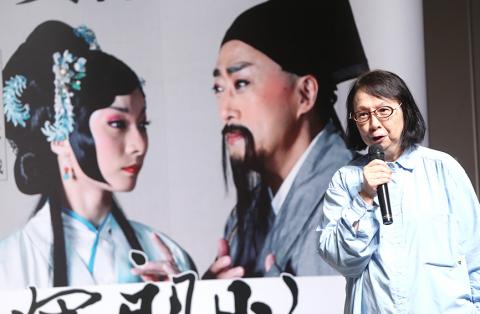The National Women’s League, under the leadership of then-chairwoman Cecilia Koo (辜嚴倬雲), from 2006 to 2016 donated NT$236 million (US$8.07 million at the current exchange rate) to entities owned by her extended family, a source told the Chinese-language Liberty Times (the sister newspaper of the Taipei Times).
The Koo family is one of the nation’s most powerful business dynasties and its members own many enterprises in the banking, securities, and rubber and cement sectors, among others.
The source, who requested anonymity, said the league funneled donations to the Koo family’s foundations registered as contributions to projects ranging from breast cancer research to establishing disaster relief centers.

Photo: CNA
However, the league directed the largest share of the donations, about NT$130 million, to the Taipei Li-yuan Peking Opera Theatre (台北新劇團), a theater group owned by Koo’s daughter, Vivien Ku (辜懷群).
C.F. Koo Foundation (辜公亮文教基金會) received NT$31 million, the Koo Foundation Sun Yat-sen Cancer Center (和信治癌中心) received NT$55 million and St John’s University in New Taipei City’s Tamsui District (淡水) received NT$20 million in league donations.
The league also moved more than NT$700 million to foundations created by the league, including more than NT$500 million to Cheng Hsin General Hospital, NT$150 million to the National Women’s League Foundation for the Hearing Impaired and NT$9 million to the Taipei Chinese Women’s Foundation (台北市華夏婦女文教基金會), among others.
Meanwhile, league chairwoman Joanna Lei (雷倩) said that Cecilia Koo’s call to nationalize the league’s remaining assets was a ploy by the Koo family to shield its interests.
In a Facebook post, Lei compared Cecilia Koo’s proposal with “suicide,” adding that implementing the plan would be tantamount to “completely dissolving the league.”
“Colleagues who have long worked for [Cecelia Koo] are absolutely convinced that the latest proposal was a plot concocted by other members of the Koo family,” she said.
An employee of the Koo family has reportedly admitted to shredding 170 boxes of league financial records, which could have potentially helped the league in its battle against the Ill-gotten Party Assets Settlement Committee, Lei said, adding that this suggests there was a conspiracy by members of the Koo family.
“The truth about the situation between December [last year] and January is increasingly clear, even though the reason behind it is still unknown to members,” she said.
The league issued a statement saying that Lei had tendered her resignation yesterday for the third time, but board members had again persuaded her to stay on.
Democratic Progressive Party Legislator Chuang Ruei-hsiung (莊瑞雄) said many of the donations were made to take care of Koo’s daughter and other family members instead of military veterans and their dependents — one of the main founding purposes of the league.

FREEDOM OF NAVIGATION: The UK would continue to reinforce ties with Taiwan ‘in a wide range of areas’ as a part of a ‘strong unofficial relationship,’ a paper said The UK plans to conduct more freedom of navigation operations in the Taiwan Strait and the South China Sea, British Secretary of State for Foreign, Commonwealth and Development Affairs David Lammy told the British House of Commons on Tuesday. British Member of Parliament Desmond Swayne said that the Royal Navy’s HMS Spey had passed through the Taiwan Strait “in pursuit of vital international freedom of navigation in the South China Sea.” Swayne asked Lammy whether he agreed that it was “proper and lawful” to do so, and if the UK would continue to carry out similar operations. Lammy replied “yes” to both questions. The

‘OF COURSE A COUNTRY’: The president outlined that Taiwan has all the necessary features of a nation, including citizens, land, government and sovereignty President William Lai (賴清德) discussed the meaning of “nation” during a speech in New Taipei City last night, emphasizing that Taiwan is a country as he condemned China’s misinterpretation of UN Resolution 2758. The speech was the first in a series of 10 that Lai is scheduled to give across Taiwan. It is the responsibility of Taiwanese citizens to stand united to defend their national sovereignty, democracy, liberty, way of life and the future of the next generation, Lai said. This is the most important legacy the people of this era could pass on to future generations, he said. Lai went on to discuss

AMENDMENT: Climate change is expected to increase the frequency of high-temperature days, affecting economic productivity and public health, experts said The Central Weather Administration (CWA) is considering amending the Meteorological Act (氣象法) to classify “high temperatures” as “hazardous weather,” providing a legal basis for work or school closures due to extreme heat. CWA Administrator Lu Kuo-chen (呂國臣) yesterday said the agency plans to submit the proposed amendments to the Executive Yuan for review in the fourth quarter this year. The CWA has been monitoring high-temperature trends for an extended period, and the agency contributes scientific data to the recently established High Temperature Response Alliance led by the Ministry of Environment, Lu said. The data include temperature, humidity, radiation intensity and ambient wind,

SECOND SPEECH: All political parties should work together to defend democracy, protect Taiwan and resist the CCP, despite their differences, the president said President William Lai (賴清德) yesterday discussed how pro-Taiwan and pro-Republic of China (ROC) groups can agree to maintain solidarity on the issue of protecting Taiwan and resisting the Chinese Communist Party (CCP). The talk, delivered last night at Taoyuan’s Hakka Youth Association, was the second in a series of 10 that Lai is scheduled to give across Taiwan. Citing Taiwanese democracy pioneer Chiang Wei-shui’s (蔣渭水) slogan that solidarity brings strength, Lai said it was a call for political parties to find consensus amid disagreements on behalf of bettering the nation. All political parties should work together to defend democracy, protect Taiwan and resist